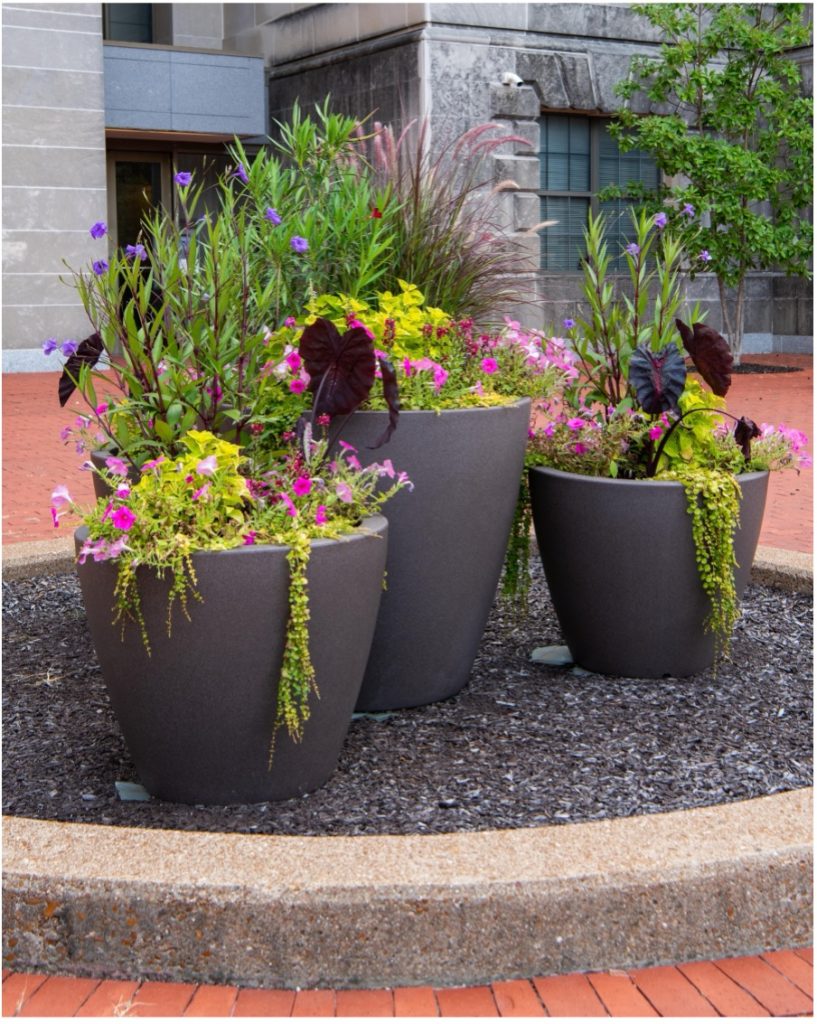Published on
Updates to infrastructure and practices improve sustainability
The Mizzou campus has long been a favorite hangout for Tigers and community members alike; from relaxing on the large expanse of grass in the Francis Quadrangle to enjoying a campus stroll on a sunny spring day. Designated the Mizzou Botanic Garden in 1999, MU has always taken great pride in the diverse collection trees and plants on its campus. Recent improvements to infrastructure and new landscaping practices will make it a little easier for MU’s Landscape Services to keep the garden in top shape.
One major project involved the greenspace on the Francis Quadrangle. When planned construction projects to replace subsurface steam lines on the Quad in summer 2024 necessitated digging and disturbing a significant portion of the greenspace, MU took the opportunity to make significant improvements to this area.
“With so much infrastructure being repaired, we decided it would be a great time to address some of the other longstanding needs for the lawn portion of the Quad,” said Kovolyan. Site improvements included re-grading the entire site to improve drainage, changing the design of the hardscape to enhance walkability, modernizing the irrigation system, replacing all the sod with a new variety that is more drought and disease resistant, and taking measures to improve soil health.
Physical changes to the topography and a new irrigation system will increase water efficiency. The entire surface of the new field of grass will be reached with the irrigation system. Coupled with the re-grade of the site, the new equipment means less leakage and more uniform water application. Irrigation run times will halve – from 40 minutes to 20 minutes. The new irrigation system also has a rain sensor to avoid unnecessary water application, and the updated steam lines will eliminate an old problem of burned grass due to heat from the old lines.
In addition to the infrastructure improvements, MU is also taking measures to improve soil health. Topsoil removed during digging was reserved for reuse. Complete removal of the existing grass provided an opportunity to amend the underlying soil with compost made from horse manure and leaf waste from a local supplier prior to placement of the new turf grass. This fall, with the new grass in place, landscape crews will apply an organic fertilizer made from turkey litter, a renewable agricultural resource.
“The new project is very slow release,” said Kovolyan. “It feeds for about four months, and it basically builds up the microbial activity of the soil, which also helps reduce disease.”
The more uniform nutrient release promotes consistent growth rates, which is healthier for the grass and evens out the mowing cycle. It is in granular form and has a pleasant, earthy odor in contrast to some other types of organic fertilizers. Because it is slow release, it will only have to be applied twice per year instead of quarterly, which cuts down on equipment use and labor.

Landscape Services is also piloting the use of self-watering containers around campus. MU uses large pots with plantings in spaces where there is hardscape without planting beds. Typically, containerized plants pose a challenge because they must be watered more often than plants in the ground. The new planters have built in water reservoirs and the inside surface is lined with reclaimed carpeting that acts as a wick to deliver the water to the plant. The water diffuses into the soil from the bottom up, promoting downward root growth and decreasing evaporation. The reservoirs can be drained to avoid freezing in winter.
Campus is a popular spot for all kinds of informal and formal gatherings and crews work tirelessly to keep everything looking nice for campus patrons. These new measures should cut down on labor and cost, while making it easier to maintain the high standard of beauty students, faculty, staff, and guests have come to expect.
“All of the changes will result in healthier, more sustainable plantings and greenspace throughout campus,” said Kovolyan. “These updates will make it easier keep things looking their best.”